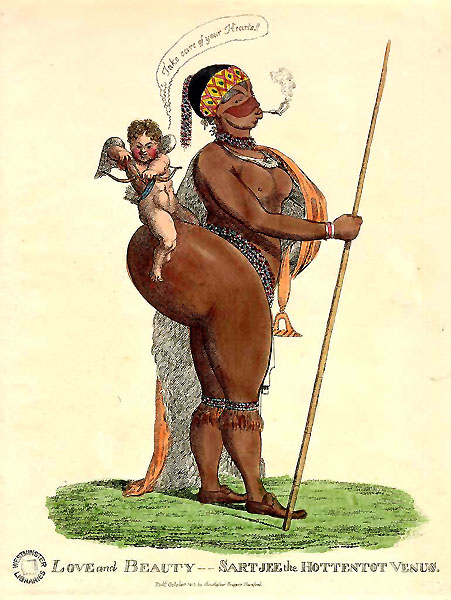Saartjie Baartman, is a woman born of the Khoikhoi tribe in present-day South Africa. In 1808, Hendrick Caezar, the brother of her former master, convinced her to leave for Europe, where they might both find fame and fortune. Their method? Exhibiting Saarjtie's body in a humiliating carnival show. English anti-slavery partisans bring the act up on charges, and so Caezar, Saartjie and a new acquaintance, bear-tamer Réaux, head for Paris. Once again, the act plays in carnivals, then in the aristocratic salons of Paris, and later on among the libertines. During this time, the French anatomist and eugenist Georges Cuvier takes an interest in her unusual anatomy (enormous buttocks and labia), but not in her mind, personality or native culture. Refusing to let the scientist fully examine her, she is effectively sold by Caezar to Réaux and finally rejected even by him to, ending up a prostitute. She dies alone of pneumonia and a venereal disease in 1815, aged only 27. Her body is returned to Cuvier and his colleagues, where is is dissected, examined, preserved and a replica displayed in the Paris Musée de l'homme until 1974.
The damnable thing is that these points of view are imminently sympathetic, even sometimes appealing. Caezar wants to earn enough money to return home to Cape Town and support his family. He wants Saarjtie to be an equal in their enterprise - or at least that's what he says. When at last he breaks down and physically assaults her, his motivating frustration is shockingly understandable. Even Réaux's appalling actions are tempered by an almost tender seduction scene. Georges Cuvier, too, has a sympathetic portrait. His aims are purely scientific, improving his knowledge of the human form, of our evolution and therefore, future as a living race upon this world. There's no malice to his endeavor.
But neither is there any humanity. And realizing this is the careful trap that Kechiche lays for us time and again, using our expectations - and eventually, our very hope - to lead us into blind alleys of disquiet. It is a small-voiced tragedy of tremendous proportions.
Vénus noire isn't distributed in the United States, despite some impressive critical accolades in France and a nomination for a Golden Lion at the 67th Venice International Film Festival. Frankly, I'm not surprised, just a little disappointed. You can get it on a Region 1 DVD from Amazon Canada.

No comments:
Post a Comment